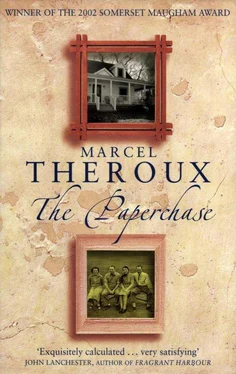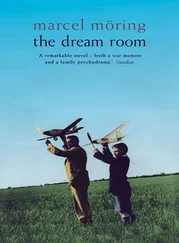Marcel Theroux
The Paperchase
THE NEWS OF MY UNCLE Patrick’s death came as a shock, not because it was sudden, but because I had assumed he’d been dead for ages.
Patrick dead. Father was all the telegram said. My first reaction was: Patrick who? And then I remembered.
If I’d given him any thought over the preceding years I’m sure I would have realised he was still alive, albeit in a world that had ceased to bear any relation to mine. It’s just that I’d been doing my best to forget everything about my family, and though I got Christmas presents every year from Aunt Judith in Boston, I was succeeding pretty well at it.
Of course I remembered Patrick — he’d just been tucked away in a distant compartment of my mind like an odd sock: present but incomplete. After all, a person doesn’t slip out of the world like a blip off a radar screen. A life ends with a death. The telegram was conclusive: it completed him. Patrick dead.
And then a strange thing happened: the news of his death resurrected him in my imagination: the Patrick that was in me, the faint but indelible stamp of him that was me. Whole sections of my memory became active for the first time in years. It was like discovering a false bottom in a suitcase; or that my tiny flat in Clapham had grown an extra storey overnight. I thought about Patrick and his crazy old house on Ionia and, strangest of all, I began to miss him — a man I had not clapped eyes on for almost twenty years.
I was in a mood to be maudlin, anyway. I had been working night shifts for months, getting in at eight in the evening and going home twelve hours later. In the quiet hours of the early morning, no one wanted to talk and there was nothing to do except stumble around the newsroom reading the newspapers or, in my case, fret over the choices that had got me there. I lived in twilight, going home each morning in sunglasses to protect my tired eyes. And the darkness seemed to have settled over every aspect of my life.
The incoming American President had inaugurated his term in office with airstrikes in the Middle East and we had been told to expect more. Extra journalists and editors had been summoned to cope with the increased workload at night, because the management had calculated that the United States would time hostilities to coincide with its evening newscasts.
‘Are we at war yet?’ said Wendy, the news editor, as she arrived for work on the evening I got the telegram.
I told her we weren’t.
‘That’s good, because I didn’t have my tin hat in my bag.’ She sat down at her terminal and began peeling an orange and prising it into bits with her stubby thumb as she read the handover. She was a great believer in the power of vitamin C to mitigate the effects of too many night shifts.
I wasn’t the only one who seemed to have forgotten Patrick. I trawled the wires thinking that the death of the author of the Oscar-nominated Peanut Gatherers deserved at least a mention, but there was nothing. He had been silent too long. Like me, the obituarists must have assumed Patrick had been dead for a decade. The telegram was in my pocket. I touched it instinctively as if to confirm that he had indeed existed.
It was a very quiet night. The rumour of war had made all other news irrelevant. Watching our newscasts, you got the feeling that the world’s concentration had narrowed to a small point, a beam of attention that excluded everything apart from a handful of politicians and journalists. But though we continued to report what they said, in reality nothing was happening. It was television’s way of twiddling its thumbs, but with more menace. It was the pregnant silence between lightning and a thunderclap.
It wouldn’t make much difference to me, however. War or no war, my duties would be the same. My job was to write the twenty seconds of talk that precedes a news report, the bit where the newsreader looks serious, or mildly amused, depending on the story, and addresses the camera. And sometimes I wrote the words that appear magically under someone’s head when they’re being interviewed. And sometimes I produced a guest from the make-up room and showed him through the labyrinth of corridors to the studio. And occasionally I might write a whole report to fit pictures that had arrived by satellite. When this happened, my name would appear at the beginning of the piece followed by the word ‘reporting’ — a word which probably overstates the journalistic value of the hundred or so words I had cobbled together from wire stories. And at the end of the piece I would sign off: ‘Damien March, BBC News’, which — because it didn’t mention a location — implicitly acknowledged that I was ‘reporting’ on the events in Prague, or Sarajevo, or wherever, from the bowels of Shepherd’s Bush. Once I had dreamed of being ‘Damien March, BBC News, Madrid’, or ‘Damien March, BBC News, on board the USS Saratoga’, But I was never more than Damien March, BBC News, and often less.
Very early on, I lost that zest for the work that marked people out for promotion. Every six months or so, there’d be a new face on the night shift: always young, nearly always a man, usually wearing a tie, and clearly just passing through our newsroom en route to higher things. I envied them their unquestioned sense of purpose — the feeling, I suppose, that they knew what they wanted, and they were becoming it. They all shared the certainty that sooner or later they would be Someone on TV, which, let’s face it, is the principal ambition of just about everyone right now. I sometimes think we are all souls in limbo, waiting hopefully to join those who have been eternised on the box.
I recognised myself in these people — getting in early, going home late, working through lunch — but as I had been years earlier. To them I was just an old lag. To me, they were sleepwalkers. I thought if you bumped them hard enough they would wake up, as I had, and feel disoriented, and not understand how or why they’d got there. Some time in the last five years, my ambition had faded away, and though I still went through the forms of my job, I’d given up expecting it to answer the question: Who am I? After ten years in television, I was remembered chiefly by my colleagues as the person who had done that report on the transvestite Thai kickboxer. And that was five years ago.
At three o’clock in the morning I had my lunch break. The canteen looked like the mess room of the Marie Celeste. I helped myself to a sausage that was as brown and shiny as old varnish, and a scoop of scrambled eggs the texture of carpet underlay. Another tray clattered onto the metal runners beside mine. It belonged to Tom, a former colleague who had been promoted onto the national breakfast show. He was also a new father.
‘How’s Niamh?’ I said. ‘How’s it being a dad?’
Tom didn’t like the look of the food on offer and asked for an omelette. ‘Being a dad? It’s the most wonderful, exasperating, inspiring, you know, all the clichés you can think of, thing that you can imagine. It’s just incredible.’
‘I can’t imagine,’ I said. ‘I can barely keep myself in clean underpants, never mind a dependant.’
‘It gives you an amazing strength,’ he said, as we waited at the till while the woman who had made the omelette wiped her hands on her apron and came round to ring up the contents of our trays. ‘I feel like I’m able to go out into the world because I have that base. Leaving in the evening, looking at Niamh and Tara in that bed — it brings out the caveman in me. It makes me want to go out and club a bear or something.’ Tom handed his loyalty card to the cashier to be validated. ‘Six more stamps and I get a free breakfast,’ he said.
Читать дальше












